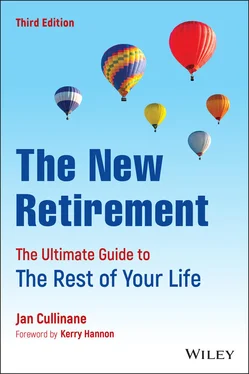Jan Cullinane - The New Retirement
Здесь есть возможность читать онлайн «Jan Cullinane - The New Retirement» — ознакомительный отрывок электронной книги совершенно бесплатно, а после прочтения отрывка купить полную версию. В некоторых случаях можно слушать аудио, скачать через торрент в формате fb2 и присутствует краткое содержание. Жанр: unrecognised, на английском языке. Описание произведения, (предисловие) а так же отзывы посетителей доступны на портале библиотеки ЛибКат.
- Название:The New Retirement
- Автор:
- Жанр:
- Год:неизвестен
- ISBN:нет данных
- Рейтинг книги:5 / 5. Голосов: 1
-
Избранное:Добавить в избранное
- Отзывы:
-
Ваша оценка:
- 100
- 1
- 2
- 3
- 4
- 5
The New Retirement: краткое содержание, описание и аннотация
Предлагаем к чтению аннотацию, описание, краткое содержание или предисловие (зависит от того, что написал сам автор книги «The New Retirement»). Если вы не нашли необходимую информацию о книге — напишите в комментариях, мы постараемся отыскать её.
The New Retirement: The Ultimate Guide to the Rest of Your Life
The New Retirement, 3rd edition,
The New Retirement — читать онлайн ознакомительный отрывок
Ниже представлен текст книги, разбитый по страницам. Система сохранения места последней прочитанной страницы, позволяет с удобством читать онлайн бесплатно книгу «The New Retirement», без необходимости каждый раз заново искать на чём Вы остановились. Поставьте закладку, и сможете в любой момент перейти на страницу, на которой закончили чтение.
Интервал:
Закладка:
Having a sound body and mind is so important for a successful retirement that Chapter 6is devoted to this “secret.” I've mentioned the word “healthspan” before, and it's worth repeating that this is the goal: “live long and prosper” – not only financially, but also physically and mentally.
Secret 5: Have a Strong Financial Plan
Ah, yes … money! For many retirement books, finance is the dominant or only topic. It's tremendously important, which is why three chapters are devoted to this “Secret.” A few stories and studies about money and retirement that are worth mentioning:
Most of us want to project a confident, got-it-together façade. So, it's very concerning that two-thirds of those in a 2021 Retirement Risk Readiness Study by Allianz Life reported they were concerned about healthcare costs, the rising cost of living, and not having enough money to do what they want in retirement, but they were not bringing up these issues with their financial professionals. Yet, the survey takers also said they would like to discuss them with their advisor. Ironic that the people who could help them may not know what is really bothering their clients. Kind of like when we go to a doctor's appointment and we are not really forthcoming on what's troubling us or symptoms we may have. So, speak up! And financial professionals … be proactive in your questions.
Does money bring happiness? Recall the ancient fable “The Golden Touch.” A king named Midas performed a good deed and was granted a wish by a god. Midas wanted everything he touched to turn into gold. The god warned him this was not a good wish, but Midas persisted, and his wish was reluctantly granted. At first Midas was thrilled with his new power, but then when he became hungry and his food turned into gold and he could not eat it, he realized he had made a BIG mistake. His beloved daughter, trying to comfort him, also turned into gold. Not scientific, but a good message that money isn't everything. (But, let's face it – it is important.)
A 2020 study in Social Psychology and Personality Science involved almost 1,300 adults who reported their income as well as how frequently, on average, they felt happy and how intensely happy they felt. The results found a higher income was related to feeling happy slightly more often, but there was no relationship to the intensity. So, money itself did not bring a giant boost in happiness, but may allow people to experience happiness more often.
“Keeping up with the Joneses.” Sarah Newcomb, PhD, a behavioral economist at Morningstar, cites three studies that found that “where a person believes they stand relative to others has a much larger effect on happiness than absolute income.” The power of social comparisons is huge; even those participants in the study making large salaries felt bad about themselves when they made upward comparisons to others. Advice: Compare yourself to those who make the same or less. Or think about how far you've advanced financially compared to your younger self – use your younger self as a reference rather than others. You'll be a lot happier than obsessing about the rich guy or gal down the block.Best view of money? It's valuable because it can buy time, freedom, and choices (although too many choices can be a negative). And, as my CPA friend says, “Retirement planning doesn't have to be hard, complicated, or stressful.” You'll agree when you read the financial chapters.
Secret 6: Have a Purpose
Recall that Secret 1 is “Have Something to Wake Up For” – what gets our juices flowing and keeps us engaged with life. But Secret 6, “Have a Purpose,” is more about the legacy we want to leave when we won't be waking up anymore! It's about making a positive, lasting change. More than 90% of preretirees in an Age Wave/Edward Jones study agree purpose is key to a rewarding retirement. Ways to do this financially and nonfinancially for our children, for our grandchildren, for causes we are passionate about, and/or for charities that represent our values are discussed in Chapter 10. It may involve money, time, or both. And, purpose and legacy are also addressed in the final chapter. As George Eliot (the Victorian novelist who was actually a woman) said, “It's never too late to be what you might have been.” Having a purpose helps us do just that.
Retirees' Regrets
We can learn a lot from people who have done or are doing something we're contemplating doing – whether it's picking a friend's brain about traveling to a particular place he/she has been to several times, asking for recommendations for dentists or doctors, conversing with people who are living in a community we are considering for relocation, and so forth. So what about those who have already retired – what financial and nonfinancial pitfalls can they warn us about? According to financial planners who work with retirees and retirees themselves, these are some of retirees' top regrets:
1 Not starting to save early enough/not saving enough (biggest regret for most).
2 Holding too much debt (car loans, mortgages, credit card, educational loans).
3 Not figuring out how much they'll need in retirement.
4 Not knowing where their money was going prior to retirement to form a basis for a budget when they retired.
5 Not knowing how to effectively invest their money.
6 Not considering major life events, such as unexpected illness or death of a spouse.
7 Claiming Social Security too early.
8 Not making catch-up contributions to retirement plans.
9 Retiring too early (not enough money) or not retiring earlier (to enjoy the gift of being in control of your own time).
10 Not considering how they will use their time in retirement (what are they retiring to – not from).
11 Not traveling more when they had the opportunity to do so.
12 Not discussing, if part of a couple, their expectations for retirement ahead of time.
13 Not enough diversity in their retirement portfolio.
14 Buying/staying in a bigger house than they really need or one that is not aging-friendly.
Lessons from the Pandemic
It would be an omission to discuss retirement without exploring the effects of the pandemic on retirees' beliefs and attitudes. A 2021 study by Age Wave, Edward Jones, and the Harris Poll provides some important insights:
61% of retirees reported that “the pandemic has given them more appreciation for what makes life meaningful.”
92% of retirees agree that “purpose is a key to a successful retirement.”
67% of retirees said “spending time with loved ones provides them with the greatest source of meaning.”
93% of retirees believe it's “important to feel useful in retirement,” and 87% said being useful “makes them feel youthful.”
89% of retirees feel that “there should be more ways for retirees to put their talents and knowledge to use for the benefit of their communities and society.”
Regarding finances of those not yet retired, a third are “contributing more to their retirement savings because of the pandemic” and a third plan to “delay retirement because of the pandemic.”
Finally, 77% “wish there were more resources available to help them plan for an ideal retirement beyond just their finances.” (And that, of course, is a major purpose of this book.)It will be interesting to see how – or if – these beliefs and attitudes will change as we return to a postpandemic “normal” or a “new normal.”
Freedom , purpose, enjoyment, stress-free. These were the most common words when more than 5,000 workers were asked in a Transamerica Center for Retirement Study what the word “retirement” meant to them. Let's turn those words into reality by exploring what to do with your “168 hours a week” in the next two chapters. And, remember, much of learning is trial and error – retirement is a brand-new experience. Keep these wise words of Nelson Mandela in mind: “I never lose. I either win or I learn.”
Читать дальшеИнтервал:
Закладка:
Похожие книги на «The New Retirement»
Представляем Вашему вниманию похожие книги на «The New Retirement» списком для выбора. Мы отобрали схожую по названию и смыслу литературу в надежде предоставить читателям больше вариантов отыскать новые, интересные, ещё непрочитанные произведения.
Обсуждение, отзывы о книге «The New Retirement» и просто собственные мнения читателей. Оставьте ваши комментарии, напишите, что Вы думаете о произведении, его смысле или главных героях. Укажите что конкретно понравилось, а что нет, и почему Вы так считаете.












